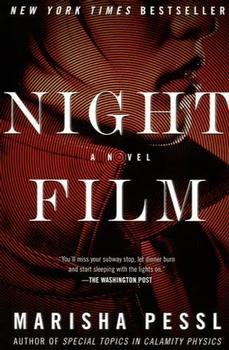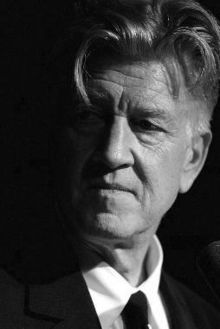Summary | Excerpt | Reading Guide | Reviews | Beyond the Book | Read-Alikes | Genres & Themes | Author Bio

This article relates to Night Film
In Night Film, Marisha Pessl seems to take inspiration from a number of movie directors including Alfred Hitchcock and Stanley Kubrick but the one whom the fictional Stan Cordova resembles the most is David Lynch.
 Born in 1946 in Missoula, Montana to middle-class parents, Lynch had an itinerant childhood moving from state to state before finally graduating from high school pretty unremarkably, in Virginia. By this time, Lynch was quite interested in the arts and decided to pursue painting at the school of the Museum of Fine Arts in Boston. He dropped out in short order eventually taking up schooling again in Philadelphia at the Pennsylvania Academy of Fine Arts, which is where he first experimented with film using a series of clips of his paintings to create a video montage. Lynch and his first wife, Peggy Reavey (who was a fellow student at the art academy), lived in the city with their daughter. The daily crimes and terrors the city sprang on the couple had a lasting effect on Lynch. He later said that the inspiration for his first highly acclaimed horror film, Eraserhead, came from living in constant fear in the "city of brotherly love."
Born in 1946 in Missoula, Montana to middle-class parents, Lynch had an itinerant childhood moving from state to state before finally graduating from high school pretty unremarkably, in Virginia. By this time, Lynch was quite interested in the arts and decided to pursue painting at the school of the Museum of Fine Arts in Boston. He dropped out in short order eventually taking up schooling again in Philadelphia at the Pennsylvania Academy of Fine Arts, which is where he first experimented with film using a series of clips of his paintings to create a video montage. Lynch and his first wife, Peggy Reavey (who was a fellow student at the art academy), lived in the city with their daughter. The daily crimes and terrors the city sprang on the couple had a lasting effect on Lynch. He later said that the inspiration for his first highly acclaimed horror film, Eraserhead, came from living in constant fear in the "city of brotherly love."
 Lynch's work is characterized by surrealism, complicated plots, and a focus on weird sound effects to create a sense of terror. Many of the images he presents are veiled and hint that a different situation is
playing out behind the scenes. Some have suggested that this method has Lynch shining light on only part of reality and that whatever remains behind the curtains or veiled, is part of the subconscious, open to individual interpretation. For those interested, entire books have been devoted to the study of the philosophy of his movies. Lynch's films are especially characterized by a large number of recurring motifs - a focus on dreams as the venue through which people act out their fears; the clinical and sterile detachment represented by machines and 'industry'; and heroines with split or fractured personalities. His many stylistic treatments include the repeated use of close-ups of the human eye - a technique that Cordova also uses in Night Film.
Lynch's work is characterized by surrealism, complicated plots, and a focus on weird sound effects to create a sense of terror. Many of the images he presents are veiled and hint that a different situation is
playing out behind the scenes. Some have suggested that this method has Lynch shining light on only part of reality and that whatever remains behind the curtains or veiled, is part of the subconscious, open to individual interpretation. For those interested, entire books have been devoted to the study of the philosophy of his movies. Lynch's films are especially characterized by a large number of recurring motifs - a focus on dreams as the venue through which people act out their fears; the clinical and sterile detachment represented by machines and 'industry'; and heroines with split or fractured personalities. His many stylistic treatments include the repeated use of close-ups of the human eye - a technique that Cordova also uses in Night Film.
 Arguably Lynch's most acclaimed movie is Blue Velvet, the central premise of the story being that small-town America harbors deep, dark secrets. In the film, a young man finds a severed ear in a field and this eventually leads him to find dark happenings in his hometown. While the movie received mixed reviews from critics, it is widely hailed as a classic with one reviewer calling it an "intense exploration of the dark side of the human soul." Below you'll find a trailer for the movie:
Arguably Lynch's most acclaimed movie is Blue Velvet, the central premise of the story being that small-town America harbors deep, dark secrets. In the film, a young man finds a severed ear in a field and this eventually leads him to find dark happenings in his hometown. While the movie received mixed reviews from critics, it is widely hailed as a classic with one reviewer calling it an "intense exploration of the dark side of the human soul." Below you'll find a trailer for the movie:
Lynch became more of a household name with the ABC television series Twin Peaks, which is set in the fictional Pacific Northwest small town of the same name. The series looks at the dark side of small-town America, one of Lynch's many recurrent motifs.
An immensely talented artist, Lynch is much more than a movie director - he has written lyrics and composed music; created paintings and maintains his own website with video clips of his recordings. Lynch is also big into transcendental meditation (TM) through his organization, The David Lynch Foundation for Consciousness-Based Education and World Peace. Through a program called Quiet Time, the foundation implements the practice of transcendental meditation as a way of relieving traumatic stress for at-risk kids in schools. The program Warrior Wellness institutes TM at army bases and VA hospitals as a way of alleviating post-traumatic stress disorder among veterans. The organization offers similar programs for other at-risk populations such as Native Americans with high rates of poverty and diseases like diabetes; abused women and the homeless.
Filed under Music and the Arts
![]() This "beyond the book article" relates to Night Film. It originally ran in August 2013 and has been updated for the
July 2014 paperback edition.
Go to magazine.
This "beyond the book article" relates to Night Film. It originally ran in August 2013 and has been updated for the
July 2014 paperback edition.
Go to magazine.
Censorship, like charity, should begin at home: but unlike charity, it should end there.
Click Here to find out who said this, as well as discovering other famous literary quotes!
Your guide toexceptional books
BookBrowse seeks out and recommends the best in contemporary fiction and nonfiction—books that not only engage and entertain but also deepen our understanding of ourselves and the world around us.